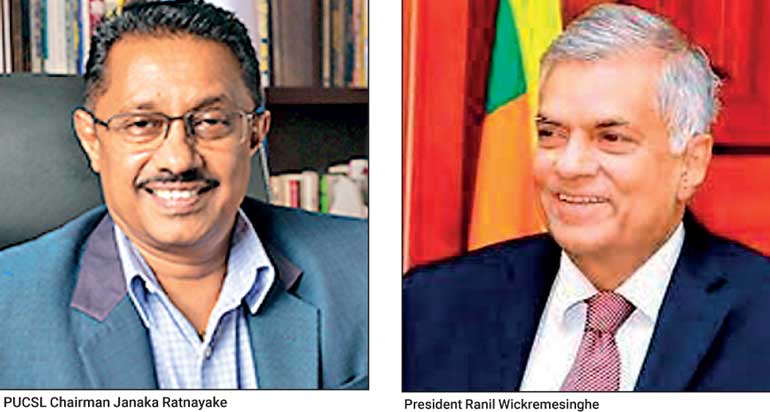Monday Feb 16, 2026
Monday Feb 16, 2026
Saturday, 10 December 2022 00:52 - - {{hitsCtrl.values.hits}}

By Charumini de Silva
Public Utilities Commission of Sri Lanka (PUCSL) Chairman Janaka Ratnayake yesterday responding to the President’s remarks in Parliament on Thursday said that the head of the State was misled by providing false information about electricity tariff determinations as well as his hotels and apartments.
Emphasising that the electricity regulator has still not formally received a request from the Ceylon Electricity Board for tariff revision for 2023, Ratnayake said that the way the CEB had predicted the demand and supply mix was problematic.
“The Commission still has not received the CEB proposal. All I know with regards to the matter is also through media reports in the past few days. However, it is still problematic to understand the rationale of the CEB to request for a tariff hike in 2023,” he told the Daily FT.
Ratnayake pointed out that in a contracting economy, it was not realistic to expect a higher electricity demand for next year, whilst noting that the demand as of now had dropped to 12% amidst the aggressive demand side management and high electricity tariffs.
“Sri Lanka’s economy is expected to contract by 9.2% in 2022 and a further 4.2% in 2023 as per the World Bank. Against this backdrop, the CEB has predicted a 20% higher electricity demand for 2023 compared to 2022, whilst assuming a higher usage of oil generation of 4,600 GWh against 230 GWh at present,” he explained.
Ratnayake claimed that these calculations are made by the CEB assuming a severe drought next year, completely neglecting the acute shortage of the foreign reserves situation in the economy.
“Firstly, the CEB Engineers are not weather experts and they should leave that to the Meteorology Department. Up to now, CEB has produced 5,000 GWh using hydropower and they have cut down on the dependency on hydro to 4,000 GWh in 2023 assuming a severe drought. All, I can say is that these officials have made the estimates based on the benefits they would garner completely ignoring the ground realities of this country,” he claimed.
He also noted that as per the electricity tariff hike approved by the Cabinet of Ministers as per the CEB, it hopes to generate an income close to Rs. 800 billion in 2023.
“In the event, the restrictions on the furnace oil and naphtha imports are eased, the current cost of Rs. 400 billion could be halved. The CEB currently buys furnace oil and naphtha for Rs.320 and Rs. 164 per litre, from the Ceylon Petroleum Corporation. As per data received by the PUCSL, CPC also gains a profit of roughly Rs. 120-140 per litre and the price reduction in the global market has also not been passed on to the consumers,” he stressed.
Ratnayake said as per the PUCSL cost projections, CEB can bring down the demand by 1,900 GWh per annum based on the most recent demand pattern with a two to three-hour load shedding and the reduction in demand due to the recent 75% price increase.
“The Commission considers this as the most plausible scenario considering the ongoing economic conditions in the country. If the correct policy decisions and the activities from the side of the utilities are taken accelerated renewable energy based electricity generation projects could be expedited,” he opined.
He also noted that technologies like Solar PV (rooftops and ground-mounted) and wind can be deployed within a short period.
“If 50 MW of such plants are added per month, about 650 GWh could be generated in 2023, making the Non-Conventional Renewable Energy contribution 3,850 GWh,” he added.
PUCSL Chief responding to President Ranil Wickremesinghe’s remarks said, electricity tariff determinations have nothing to do with his public sector job, whilst thanking the head of the State for the free publicity given to all his businesses.
“I like to thank the President for giving Trillium Group good publicity,” he quipped.